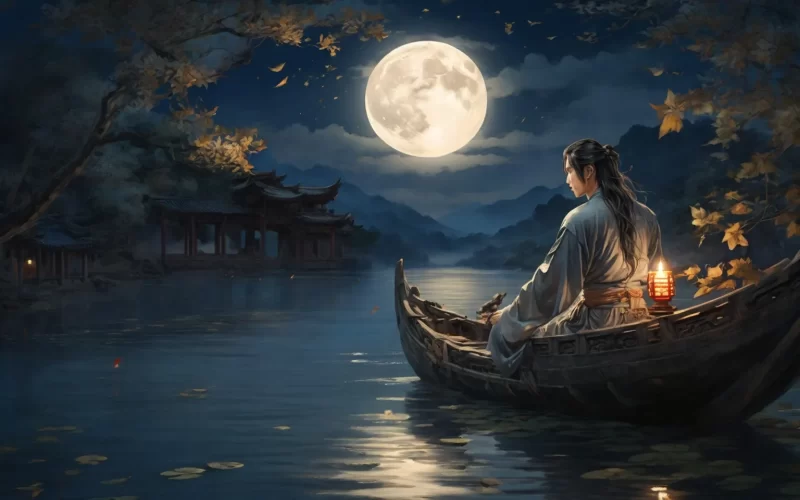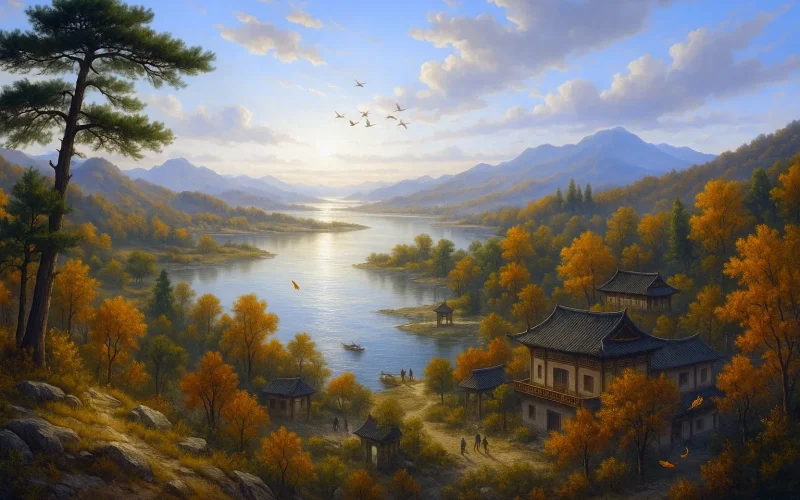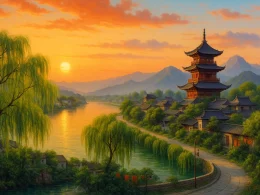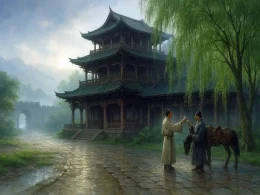With monkeys whimpering on the shadowy mountain,
And the river rushing through the night,
And a wind in the leaves along both banks,
And the moon athwart my solitary sail,
I, a stranger in this inland district,
Homesick for my Yangzhou friends,
Send eastward two long streams of tears
To find the nearest touch of the sea.
Original Poem
「宿桐庐江寄广陵旧游」
孟浩然
山暝听猿愁,沧江急夜流。
风鸣两岸叶,月照一孤舟。
建德非吾土,维扬忆旧游。
还将两行泪,遥寄海西头。
Interpretation
This poem was composed in 730 CE, when Meng Haoran was forty-one years old. The previous year, he had failed the imperial examinations in Chang'an and, in bitterness, wrote "No more petitions at the palace's northern gate; / Back to my humble hut by South Mountain, I'll make straight," resolving to retire. However, the Meng Haoran who returned to reclusion did not find true peace. In the autumn of 730, he left Xiangyang and embarked on a journey of several years through the Wu and Yue regions. This was a self-imposed exile, a spiritual wandering. He traveled along the Han River into the Yangtze, passed through Xunyang, Jiande, and anchored at Tonglu, heading east all the way to central Yue. Outwardly, it was sightseeing; in reality, it was an attempt to dilute the pain of failure through geographical distance. The familiar landscapes of Xiangyang had now become memories to escape—because every scene of his homeland reminded him that "he returned still a commoner."
The Tonglu River flows through present-day Tonglu County in Zhejiang, its banks famed for their pristine beauty, a place celebrated in verse by Southern Dynasty literati like Xie Lingyun and Shen Yue. Yet when Meng Haoran moored his boat here, he had no heart for the scenery. The five words "Jiande is not my native soil" in the poem reveal the true nature of this wandering: he was not "traveling," but "drifting." Jiande was not home; Weiyang (Yangzhou) was not home; none of the southeastern landscapes were home. He was but a rootless lone boat, carried by the river of fate toward an unknown distance. The poem's title, "Sent to Old Friends in Guangling," discloses its true motive for composition. Guangling, modern Yangzhou, was the most prosperous metropolis in the southeast during the Tang and a place where Meng Haoran had previously befriended fellow poets during his travels. Moored at night on the Tonglu River, facing the solitary boat and cold waters alone, those days in Yangzhou of poetic revelry and high spirits suddenly felt immensely distant, and immensely precious. Thus, he entrusted two lines of hot tears to the torrential east-flowing river—the only token he could send to that distant place.
First Couplet: "山暝听猿愁,沧江急夜流。"
Shān míng tīng yuán chóu, cāng jiāng jí yè liú.
Mountains darken; I hear gibbons' mournful cries. / The river, blue and vast, through night flows swift and sighs.
The opening bears a somber, heavy pressure. "Mountains darken" is the visual descent; "gibbons' mournful cries" is the aural lament. Gibbon cries were a conventional symbol of traveler's sorrow in classical poetry, but Meng Haoran uses not "gibbons cry" but "I hear gibbons' mournful cries"—it is not the gibbons that are mournful, but the listener. This single-word shift turns the entire scene from objective description to subjective projection. The five words "through night flows swift and sighs" contain the poem's heaviest force. "Swift" describes the water's momentum and, more so, is an externalization of inner turmoil. Why is the river swift? Pressed by the mountains, urged on by the night, and, most of all, it is the poet's own unsettled sorrow, pouring forth through the river's flow. At this moment, Meng Haoran is like this lone boat on the river, pushed by unseen forces, not knowing where the shore is, not knowing when it can stop.
Second Couplet: "风鸣两岸叶,月照一孤舟。"
Fēng míng liǎng àn yè, yuè zhào yī gū zhōu.
Wind rustles leaves on either bank, a mournful sound; / The moon shines on my solitary boat, lone and bound.
This couplet is the ultimate Tang expression of "solitude." "Wind rustles" is the clamor of all things—the entire mountain forest trembles in the wind, every leaf uttering its own sound. And amidst this cacophony, "my solitary boat" is illuminated alone by the moonlight, like a single spotlight on a stage. This is not merely a contrast between the many and the one; it is the isolation of the self from the world. "The moon shines" is, by nature, an indifferent phenomenon, but here, moonlight becomes a kind of judgment: it does not shine on the green mountains, nor on the river, but singles out this lone boat, as if to leave the poet's loneliness nowhere to hide. Wang Wei wrote, "In the deep woods, unknown to man, / The bright moon comes to shine on me." That is the fulfillment of solitude. Meng Haoran's line, however, is the inescapability of solitude. The same bright moon, in the eyes of a recluse, is a confidant; in the eyes of a wanderer, it is a witness—witnessing that he has nothing, witnessing that he has no one.
Third Couplet: "建德非吾土,维扬忆旧游。"
Jiàndé fēi wú tǔ, wéiyáng yì jiù yóu.
Jiande is not my native soil, I know; / I long for old friends in Weiyang, as waters flow.
The transition from scene to feeling is as natural as a river changing course. "Jiande is not my native soil" is the true condition of this journey and the fundamental predicament of Meng Haoran's later life: he could not return to Xiangyang, could not reach Chang'an; Jiande was not home, Weiyang was not home. All geographical coordinates are but footnotes to "not my native soil." Thus, "I long for old friends in Weiyang" is not mere nostalgia, but a desperate search for belonging. He longs not for Yangzhou's scenery, not for its prosperity, but for the self he was when accompanied by friends in Yangzhou. At that time, he had not yet failed the exams, not yet endured the humiliation of being "abandoned by a sage lord," not yet been cornered by time and fate. Rather than saying he misses old friends, it is more accurate to say he misses the self that could still be recognized by those old friends.
Fourth Couplet: "还将两行泪,遥寄海西头。"
Hái jiāng liǎng háng lèi, yáo jì hǎi xī tóu.
What can I do but send these two lines of tears, / To the far-off west of the sea, across the years?
The conclusion sees a surge of emotion, yet it is held firmly in check by the phrase "What can I do but." "These two lines of tears" is the poem's only direct expression of feeling, yet, due to the heavy铺垫 of the previous six lines, it appears utterly unforced. These tears are not an outburst, but a conclusion; not a collapse, but a delivery. "To the far-off west of the sea" employs an action that seems to defy physics—how can tears be sent afar? But it is precisely in this illogicality that deep feeling resides. The poet knows the friends will not receive these tears, just as he knows he can never return to that time. Yet he must still write, must still send, must still let the river carry these two lines of salt-bitter liquid, as if, by merging with the blue river, they could follow the night flow to that place called Weiyang.
This is the ritual in despair, the wanderer's final salute to a stable world.
Overall Appreciation
This is a representative work from Meng Haoran's Wu-Yue wandering period and a pinnacle of Tang poetry on the theme of "traveler's sorrow." The poem's profound tragedy lies not in its exhaustive depiction of the bitterness of wandering, but in its portrayal of the wanderer who has nowhere, even, to "return" to. After leaving Chang'an, Meng Haoran wrote of returning to his "humble hut by South Mountain"; he still had a South Mountain to return to, a humble hut to keep. But here on the Tonglu River, Jiande is not his soil, Weiyang is a memory of old travels, and Xiangyang is a thousand li away. All his geographical coordinates are "not my native soil"; all his emotional anchors are "memories of old friends."
This is the confession of a rootless man. It is not that he does not wish to go home; it is that home has become unreachable, both spatially and temporally. Structurally, the poem exhibits a precise trajectory of "from outside in": the first couplet is the external world of mountain and river; the second is the immediate environment of wind and moon; the third is the psychological space of geography and memory; the fourth is the internal flood of tears and heart. Between the four couplets, the field of vision continuously contracts, while the emotion continuously expands, until, at the end, it is like a dam breaking, yet the release is achieved in the most restrained manner—not wailing, but just two clear lines of tears, sent far to the west of the sea. This "surge within restraint" is the essence of Meng Haoran's later poetic world.
Artistic Features
- The Treatment of Imagery as Isolated and Absolute: The core images of the poem—"swift night flow," "solitary boat," "two lines of tears"—all possess an indivisible wholeness. The river is not any river, but "swift night flow"; the boat is not any boat, but "solitary boat"; the tears are not many tears, but "two lines." Each image is pared down to its essence, unable to be reduced further.
- A Dissonant Symphony of Sound and Sight: The first couplet begins with "hear gibbons' cries," the second continues with "wind rustles," dense with aural imagery; while "moon shines," "solitary boat," and "two lines of tears" are purely visual. Sound and sight interweave, making the night on the Tonglu River both noisy and silent, both clamorous and lonely.
- The Emotional Coding of Place Names: Jiande, Weiyang, the west of the sea—three place names form the emotional coordinate system of the poem. Jiande is the place of present hardship, Weiyang the memory of past warmth, the west of the sea the emotional direction of a distant future. Place names are no longer mere geographical markers but become emotional contour lines on the map of the poet's life.
- The Creative Transformation of the Tear Image: Countless Tang poems write of tears, often as "weeping wets the clothes" or "tears fall like rain." Meng Haoran's "What can I do but send these two lines of tears" transforms tears from a passive "flowing" to an active "sending," giving sorrow a direction and fragility a kind of strength.
Insights
This work tells us: The essence of drifting lies not in having no direction, but in the terrible realization that every direction points toward a past that cannot be reclaimed. The two lines of tears Meng Haoran shed on the Tonglu River were not to seek sympathy, nor to indict fate. He simply wanted to make himself remember that he once had people to miss with tears, that he once had times worth missing with tears. In the boundless drift, this act of "remembering" itself is the final anchor.
Every age has countless people for whom "Jiande is not my native soil"—they left their hometown but never reached a distant place; they are in a foreign land, yet their hearts belong to another foreign land. The geographical home has long blurred, while the coordinate in memory grows ever clearer. Meng Haoran, for all such people, wrote a letter with no address, sent to a place called "the west of the sea." That letter was never received. But those two lines of tears still hang, to this day, between the lines of Tang poetry, waiting for everyone who feels, in the deep of night, that they have nowhere to belong, to recognize them across the river.
Poem translator
Kiang Kanghu
About the poet
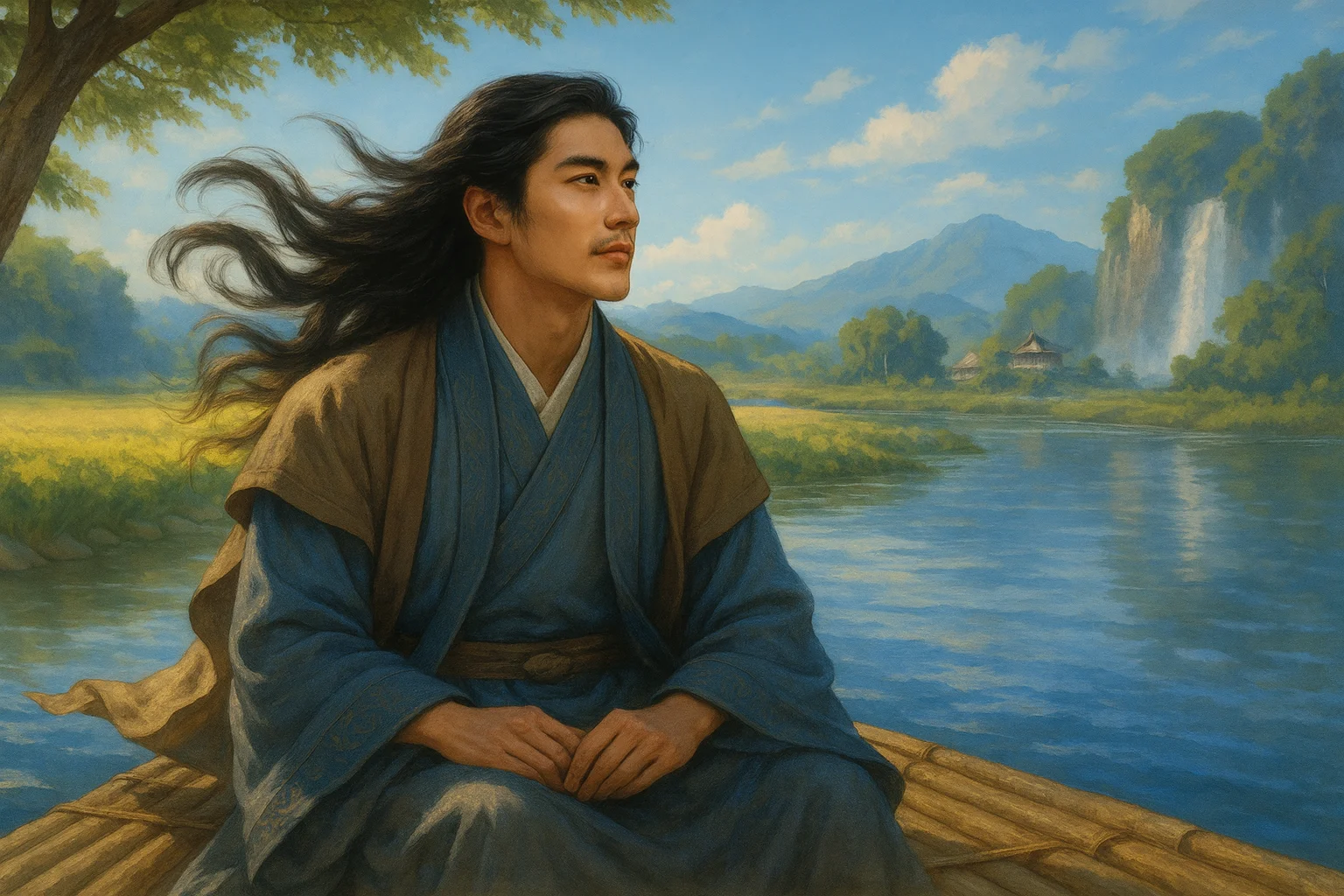
Meng Haoran (孟浩然), 689 - 740 AD, a native of Xiangyang, Hubei, was a famous poet of the Sheng Tang Dynasty. With the exception of one trip to the north when he was in his forties, when he was seeking fame in Chang'an and Luoyang, he spent most of his life in seclusion in his hometown of Lumenshan or roaming around.






